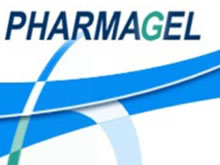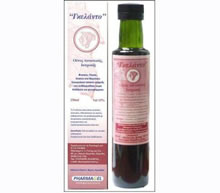
Λεξικό .. Allerkin (Lofarma).
Allerkin (Lofarma). Trade name for intranasal specific immunotherapy, for the treatment of allergic rhinitis. Allerkin consists of a set of capsules which contain allergen in a graded controlled powder, suitable for intranasal absorption. Allergens are standardized and titrated in 40 Allergenic Units (A.U.) per capsule. It has been studied for intranasal administration by means of a special insufflator, allowing greater stability of the product in time and the complete exclusion of preservatives agents. The granulometric characteristics of the powder have been specially studied in order to reach the nose thus making it impossible for the powder to reach the lower airways. The predosed allergen is in capsules safeguards. Both the doctor and the patient are protected against any possibility of an error of overdosage. At present, Allerkin is available for the epidemiological allergens of greater interest, such as those caused by grasses, parietaria, birch, ragweed, and house dust mites. Absorption of allergenic molecules at nasal level and the immunological responses to specific intranasal immunotherapy have been observed. In the nasal secretions of patients treated with allergen, specific-allergen antibodies IgE and IgA were also observed, while in patients treated with placebo there was only a post-seasonal increase in IgE. The increase in these antibodies in a parallel way with the diminishing of the symptoms confirm the efficacy of this type of local intranasal specific immunotherapy. Double blinded controlled trials showed a reduction in both the nasal obstruction and the nasal secretions, with an almost total disappearance of the rhinitis symptomatology. After immunotherapy, nasal sensitivity to pollens measured by nasal provocation test (NPT) significantly decreased in the treated groups, whilst no difference was observed in the control groups. Both the clinical benefits and the immunological modifications at local level, shown with the increase in secretory IgG's and IgA's, are dose-dependent and strictly correlated to the molecular weight of the allergen, which, if sufficiently low, is capable of stimulating the immunitory system by means of the Antigen Presenting Cells. The capsules with the allergens have to be inhaled by means of the nasal inflator provided. Inhalations have to be performed three times a week, alternating the days and the nostrils. Therapeutic sets are dispensed according to individual medical receipt.
Each package contains: 1 Insufflator, 1 brush, and 1 swab, 1 lancette, 1 instructions brochure. The pre-seasonal sets, according to therapeutic indications contain 60 capsules, 6 for every dosage as follows: 2.5, 5, 10, 20, 40, 60, 80, 120, 160, 240 A.U. If therapy ends much before the beginning of the pollen season, the treatment has to be continued every five days and by alternating the nostrils. In this case packages containing one blister with 6 capsules are available. The maintenance sets contain 6 capsules at 60 A.U., 80 A.U., 120 A.U., 160 A.U., and 24 capsules at 80 A.U., 120 A.U., 160 A.U., 240 A.U. Nasal immunotherapy in powder form can be a valuable short-term option in patients with allergic rhinitis[1].
References
1. Palma-Carlos AG, Santos AS, Pregal A. Short-term efficacy of nasal immunotherapy. Allerg Immunol (Paris). 1998 Jan;30(1):14-7.
Γκέλης Ν.Δ. - Λεξικό Αλλεργίας - Εκδόσεις ΒΕΛΛΕΡOΦΟΝΤΗΣ - Κόρινθος 2013
Gelis Ν.D. - Dictionary of Allergies - VELLEROFONTIS Publications - Corinth 2013




